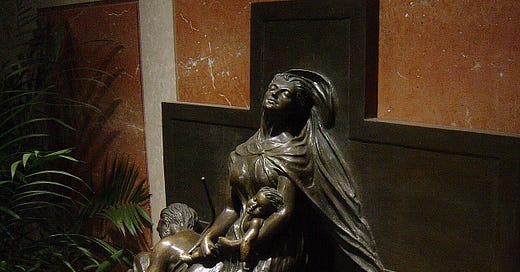Creatures, one of the communities that has shaped my life has a regular practice of reflecting on the question, “Why are you a conservative?” And so I’ve spent a fair amount of time defending and considering propositions like, e.g., I am a conservative because I believe in that authority which can only be accepted in liberty. (You can see a few entries in this genre, from the antediluvian year of 2008, here. As always, part of the purpose of this newsletter is exhibitionism-as-humility.)
Which is why, the other day, I found myself thinking, I am a conservative because… we need order, which means we need to be neighbors.
People need order to raise children in. Not perfect safety, but enough safety that you can let your kids take risks. Not stasis, but enough stability that you can occasionally plan and see your plans fulfilled. (I know, “Man plans, God laughs”… but maybe not always.) Enough order that you don’t hide behind barred windows—or broken ones. The purpose of order is the neighborhood. The purpose of order is to make it possible for us to care for one another.
And yet of course any time somebody promises you “law and order” you know some evil chaos is about to be unleashed. I had a tag on my old blog that was just, “order is chaos,” which isn’t nuanced but is clarifying.
As I’ve been calling my representatives, an exotic experience if your hometown is America’s Best Colony, I find that I keep saying this: Thank you for defending migrants—they’re our neighbors, or, Don’t make it harder for migrants to get health care—they’re our neighbors. What disrupts the order of the neighborhood isn’t people who got caught in a broken immigration system, and were left undocumented in spite of their best efforts (this is happening to someone I know and it’s terrifying). It isn’t people who came here the best way they could figure out, for all the same reasons of hope and money and safety and freedom that my ancestors came here. What disrupts the order of the neighborhood is masked agents, families ripped apart, peaceful people sent to be tortured or disappeared.
The Road to Jericho
I do try to neighbor, actively, as a verb. And “we need order so we can care for our neighbors” gets you to a condemnation of Mass Deportations Now, which is where my thinking toward this substack post started.
It also helped me articulate why I do not have enormous patience for online radicals making online noises about how looting is the language of the oppressed, stealing is nbd and in fact good, crime is fake, et cetera. That isn’t a neighborly worldview! Don’t defend theft—a teen might shoplift once or twice, people might freelance for survival and we don’t have to go crazy about it, but it gets very depressing when all the shelves at the CVS are either empty or locked behind glass. Don’t riot; it hurts the neighborhood and makes the people who hate your neighbors happy. This is basically a worldview I’ve known since childhood: compromised, bourgeois, protective and disciplinary. It’s a very Ward Four set of attitudes and beliefs. And Ward Four was a good place to grow up in!
But this whole way of thinking does miss something. We are not called just to love our neighbors. The Hebrew Bible emphasizes that we are called to love the stranger in the land, also, because we were strangers in the land of Egypt. And Jesus goes beyond even loving the stranger. He becomes the stranger: the refugee, the subject, the slave. Not a neighbor but a person with no place to lay His head.
I have done some neighboring, now and then, but I haven’t ever tried to imitate Christ in this way. To follow Jesus completely would mean not only to love my neighbor but to love the stranger; and not only to love the stranger, but to become a stranger in the land.
In this connection I’m especially struck by two of Pope Leo XIV’s early appointments. Which I heard about from the Pillar—go, subscribe! The first bishop he appointed in the US, Bp. Michael Pham, is a refugee and staunch defender of migrants. (That story stands out to me for a lot of reasons, not least of which is Bp. Pham’s attention to the consciences of people who work in deportation.) And his first episcopal appointment in mainland China is Bp. Joseph Lin Yuntuan—a bishop from the underground Church, not the officially-approved Chinese Catholic Patriotic Association.
No clue how these men will live out their offices. But a refugee-bishop and an underground-bishop—these are powerful images of Christ.
Photo of a statue at the National Basilica of the Shrine of the Immaculate Conception depicting the Holy Family resting on the flight into Egypt, by Elizabeth Roy and used under a Creative Commons license.


